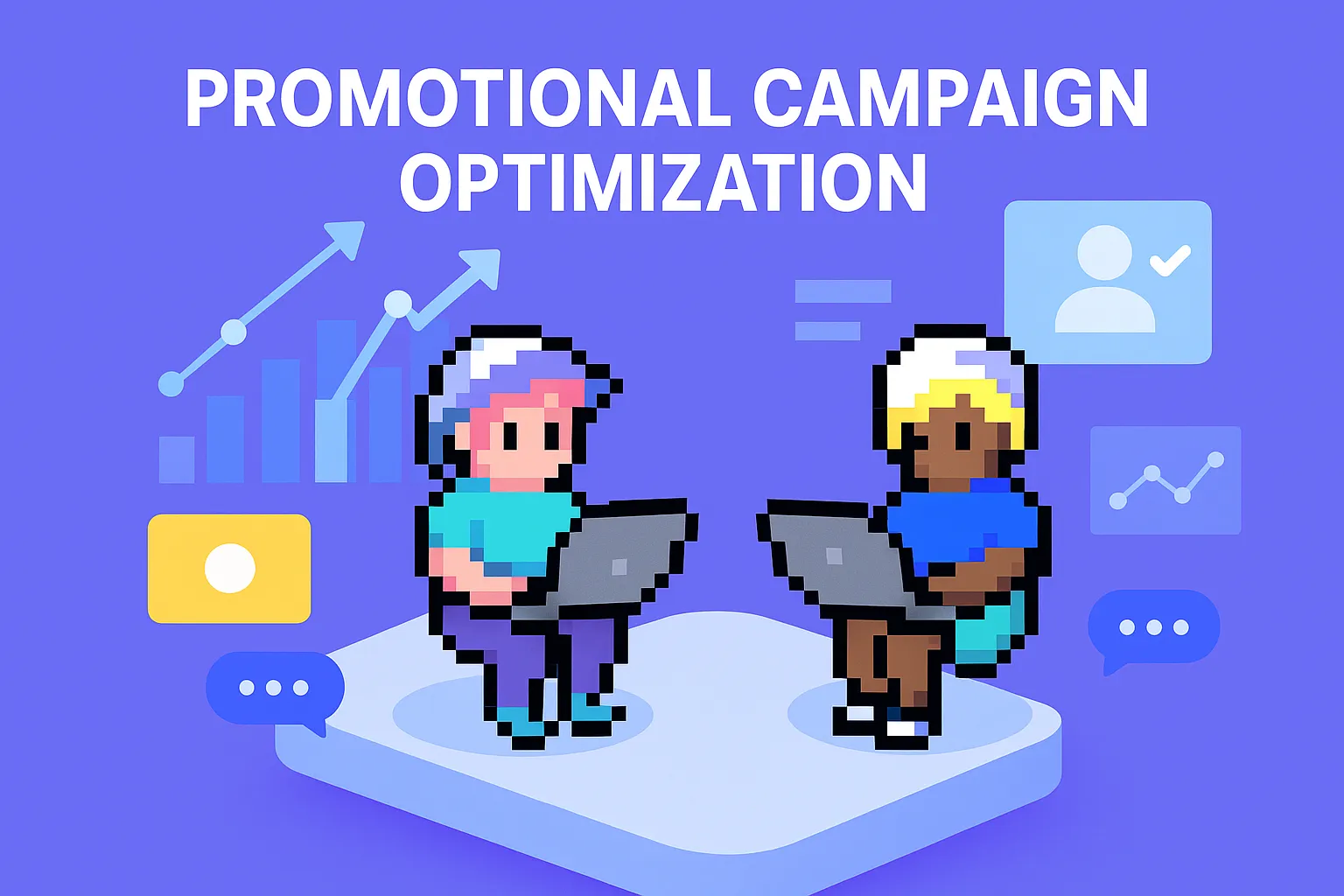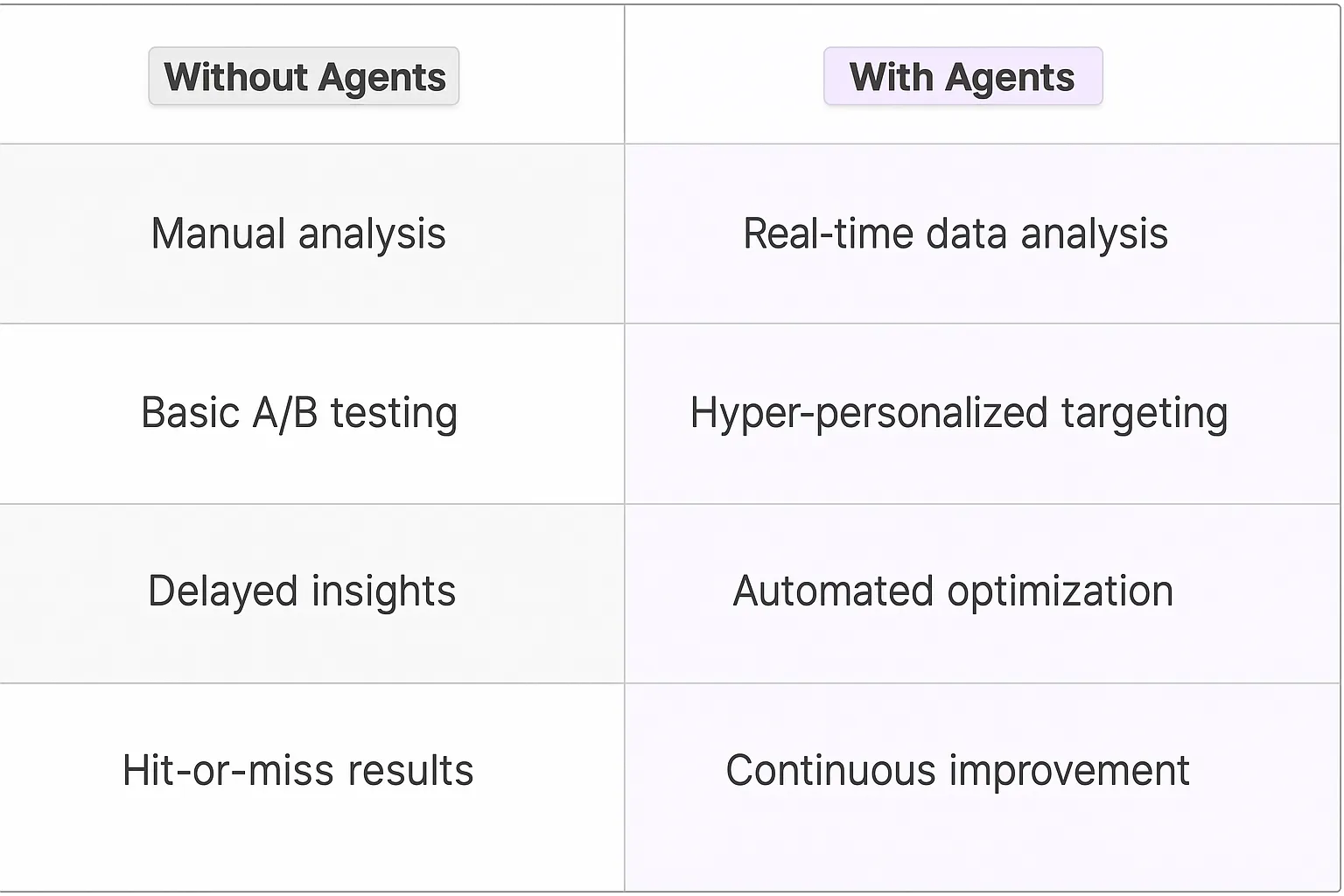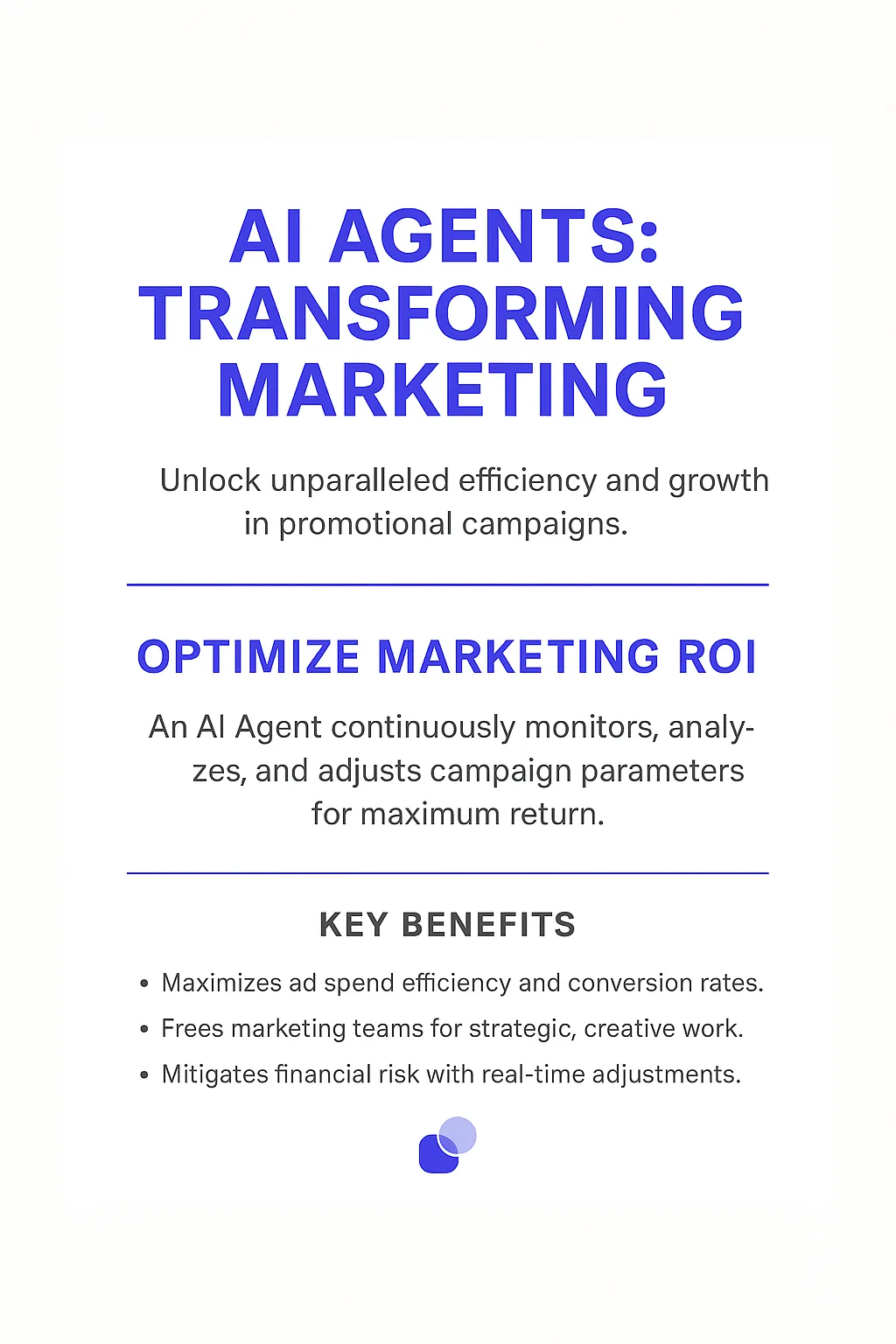Promotional Campaign Optimization AI Agents
Understanding AI-Driven Promotional Campaign Optimization
What is Promotional Campaign Optimization?
Promotional Campaign Optimization is the process of fine-tuning marketing campaigns to maximize their effectiveness and return on investment. It involves analyzing data, adjusting strategies, and refining messaging to improve campaign performance. With AI agents, this process becomes more dynamic and data-driven, allowing for real-time adjustments and personalized targeting at scale.
Key Features of Promotional Campaign Optimization
The key features of AI-driven Promotional Campaign Optimization include:1. Real-time data analysis and decision-making2. Hyper-personalized audience segmentation3. Automated A/B testing at scale4. Predictive analytics for budget allocation5. Dynamic content personalization6. Timing optimization for maximum engagement7. Sentiment analysis and rapid response capabilities8. Continuous learning and improvement algorithmsThese features enable marketers to create more effective, efficient, and responsive campaigns that adapt to changing market conditions and consumer behaviors.

Benefits of AI Agents for Promotional Campaign Optimization
What would have been used before AI Agents?
Before AI agents entered the scene, promotional campaign optimization was a manual, time-consuming process. Marketers relied on a combination of gut instinct, historical data, and basic A/B testing. They'd spend hours poring over spreadsheets, trying to decipher patterns and predict outcomes. It was like trying to solve a Rubik's cube blindfolded – possible, but incredibly inefficient.
Teams would often operate in silos, with limited cross-functional collaboration. The result? Campaigns that were often hit-or-miss, with significant resources wasted on underperforming strategies. It was a world of educated guesses and delayed insights, where agility was more aspiration than reality.
What are the benefits of AI Agents?
Enter AI agents for promotional campaign optimization. These digital teammates are game-changers, transforming how we approach marketing strategies. They're not just tools; they're cognitive collaborators that bring a new level of intelligence to the table.
First off, AI agents excel at pattern recognition on a scale humans simply can't match. They can analyze vast datasets in real-time, identifying trends and correlations that would take a human team weeks to uncover. This means campaigns can be optimized on the fly, adapting to market changes as they happen, not after the fact.
But it's not just about speed. These AI agents bring a level of precision to targeting that's unprecedented. They can segment audiences with surgical accuracy, ensuring that each message reaches the right person at the right time. It's like having a personal shopper for every single customer in your database.
Perhaps most importantly, AI agents learn and improve over time. Each campaign becomes a data point, feeding back into the system to refine future strategies. It's a virtuous cycle of continuous improvement that compounds over time, leading to exponentially better results.
The beauty of these AI agents is that they free up human marketers to focus on what they do best: creativity and strategy. While the AI handles the heavy lifting of data analysis and optimization, humans can dive deeper into crafting compelling narratives and innovative campaign concepts.
In essence, AI agents for promotional campaign optimization aren't just improving the process – they're redefining what's possible in marketing. They're turning what was once a high-stakes guessing game into a data-driven, precision-targeted operation. And in a world where consumer attention is the ultimate currency, that's not just an advantage – it's the future of marketing itself. Marketers who embrace these digital teammates will have a significant edge in the attention economy.

Potential Use Cases of AI Agents for Promotional Campaign Optimization
Processes
AI agents for promotional campaign optimization are game-changers in the marketing world. They're not just tools; they're digital teammates that can transform how we approach campaign strategy and execution. These agents can analyze vast amounts of data, spot trends, and make real-time adjustments that human marketers might miss.
One key process these AI agents excel at is audience segmentation. They can sift through customer data at lightning speed, identifying micro-segments based on behavior patterns, preferences, and past interactions. This granular approach allows for hyper-personalized campaigns that speak directly to each segment's unique needs and desires.
Another critical process is A/B testing on steroids. AI agents can simultaneously run and analyze hundreds of variations of ad copy, images, and calls-to-action. They continuously learn from the results, refining the campaign elements that resonate most with each audience segment. This iterative process happens in real-time, ensuring that campaigns are always optimized for maximum impact.
Tasks
When it comes to specific tasks, AI agents for promotional campaign optimization are versatile powerhouses. They can tackle everything from predictive analytics to creative asset generation.
One task where these agents shine is budget allocation. They can analyze historical campaign data, current market trends, and competitor activities to recommend the optimal distribution of ad spend across different channels and audience segments. This data-driven approach ensures that every dollar is invested where it's likely to generate the highest return.
Content personalization is another task where AI agents excel. They can dynamically adjust email subject lines, ad copy, and landing page content based on individual user preferences and behaviors. This level of personalization was once a pipe dream for marketers, but AI agents make it a scalable reality.
Timing optimization is a subtle but crucial task that AI agents handle with finesse. They can determine the best times to send emails, post on social media, or display ads based on when each user is most likely to engage. This precision timing can significantly boost open rates, click-throughs, and conversions.
Lastly, these AI agents can perform sentiment analysis on social media and customer feedback channels. They can gauge public reaction to campaigns in real-time, alerting marketers to potential issues or opportunities for engagement. This rapid feedback loop allows for agile campaign adjustments that can turn potential PR nightmares into brand wins.
In the world of promotional campaign optimization, AI agents are not replacing human marketers; they're amplifying our capabilities. They handle the data-heavy lifting, freeing us to focus on strategy and creativity. As these agents continue to evolve, they'll push the boundaries of what's possible in marketing, driving unprecedented levels of personalization and efficiency. The marketers who embrace these digital teammates will have a significant edge in the attention economy.

Industry Use Cases
AI agents are reshaping promotional campaign optimization across sectors, offering tailored solutions that go beyond traditional marketing approaches. These digital teammates are not just tools; they're game-changers that bring a new level of precision and adaptability to campaign strategies. Let's dive into some industry-specific scenarios where AI agents are making waves in promotional efforts.
From e-commerce to finance, these AI-powered allies are transforming how businesses connect with their audience, analyze performance, and iterate on their campaigns. They're not replacing human creativity but amplifying it, allowing marketers to focus on high-level strategy while AI handles the data-heavy lifting. The result? Campaigns that are more targeted, more responsive, and ultimately more effective.
As we explore these use cases, you'll see how AI agents are becoming indispensable partners in crafting promotional campaigns that resonate deeply with audiences and drive measurable results. These aren't just incremental improvements; they're fundamental shifts in how we approach marketing in the digital age.
Retail: Precision-Targeted Promotions with AI
The retail industry is ripe for disruption with Promotional Campaign Optimization AI agents. These digital teammates are changing the game, transforming how brands connect with consumers and drive sales.
Take a mid-sized fashion retailer. Traditionally, they'd blast out generic promotions to their entire customer base, hoping something sticks. It's a spray-and-pray approach that wastes resources and often falls flat.
Enter the AI agent. This digital powerhouse crunches through mountains of data - purchase history, browsing behavior, social media activity, even local weather patterns. It's not just looking at what customers bought, but why they bought it, when they bought it, and what they might buy next.
The AI doesn't just segment customers; it creates hyper-personalized micro-segments. It might identify a group of millennial women in urban areas who buy sundresses in early spring, prefer pastel colors, and are influenced by specific Instagram influencers.
Armed with these insights, the AI crafts tailored promotional campaigns. It's not just deciding what products to promote, but optimizing campaigns - the timing, the channel, the messaging, even the color scheme of the email.
For our sundress-loving millennials, the AI might trigger a campaign in late February, featuring a curated collection of pastel sundresses. The email goes out at 7 PM on a Wednesday (when this segment is most likely to engage), with copy that echoes the tone of their favorite influencers.
But the AI's job isn't done. It monitors the campaign in real-time, continuously learning and adjusting. If certain products are underperforming, it might tweak the pricing or swap them out. If engagement rates dip, it could alter the send times or refine the messaging.
The results? Conversion rates that make marketers weep with joy. Customer engagement that builds brand loyalty. And a level of personalization that makes each customer feel like the brand just gets them.
This isn't some far-off future. It's happening now, and it's separating the retail winners from the also-rans. The brands that embrace these AI agents aren't just optimizing campaigns - they're redefining what a promotional campaign can be.
Travel Industry: AI-Driven Personalized Vacation Packages
The travel industry is undergoing a seismic shift, thanks to Promotional Campaign Optimization AI agents. These digital teammates are redefining how travel companies craft and deliver vacation packages, creating experiences that feel tailor-made for each traveler.
Consider a mid-sized online travel agency. In the past, they'd push out generic "summer getaway" or "winter escape" promotions, hoping to catch someone's eye. It was a blunt instrument in a world that demands surgical precision.
Now, let's add an AI agent to the mix. This digital dynamo doesn't just look at booking history; it dives deep into a traveler's digital footprint. It analyzes social media posts, review site activity, credit card transactions, and even fitness app data. The goal? To understand not just where a person has been, but where they dream of going and what experiences they crave.
The AI creates intricate traveler personas. It might identify a cluster of adventure-seeking couples in their 30s, with a penchant for eco-friendly accommodations, a love for local cuisine, and a habit of planning trips around obscure music festivals.
Armed with these insights, the AI crafts hyper-personalized vacation packages. It's not just picking destinations; it's curating entire experiences. For our festival-loving eco-warriors, it might create a package centered around a little-known music festival in Costa Rica, featuring stays in sustainable treehouses and guided tours of local organic farms.
The AI optimizes every touchpoint of the promotional campaign. The email lands in inboxes on a Monday morning, when this segment typically starts daydreaming about escapes. The subject line teases adventure, while the content showcases Instagram-worthy views and raves about the farm-to-table dining scene.
But the AI's work is far from over. It monitors engagement in real-time, continuously refining its approach. If certain aspects of the package aren't resonating, it might swap in different activities or adjust the pricing. If click-through rates are lower than expected, it could tweak the visuals or refine the copy.
The outcomes are transformative. Conversion rates skyrocket as travelers find packages that feel like they were designed just for them. Customer satisfaction soars, leading to glowing reviews and fierce brand loyalty. And the level of personalization creates a sense of exclusivity that has travelers coming back for more.
This isn't a far-off possibility; it's happening right now. The travel companies leveraging these AI agents aren't just selling vacations - they're crafting dreams and delivering memories. In an industry where differentiation is key, these AI-driven promotional campaigns are becoming the secret weapon of market leaders.
Considerations
Technical Challenges
Implementing a Promotional Campaign Optimization AI Agent isn't a walk in the park. It's more like trying to solve a Rubik's Cube blindfolded while riding a unicycle. The technical hurdles are real, and they're not for the faint of heart.
First up, data integration. You're dealing with a mishmash of data sources - customer behavior, market trends, competitor actions, and historical campaign performance. It's like trying to bake a cake with ingredients from a hundred different stores. Your AI agent needs to seamlessly pull all this data together, clean it up, and make sense of it. And let's be real, most companies' data is about as organized as a teenager's bedroom.
Then there's the machine learning model itself. You're not just building a simple regression model here. You're looking at complex, multi-dimensional optimization problems. Your AI needs to balance short-term gains with long-term customer value, juggle multiple campaign elements simultaneously, and adapt in real-time to changing market conditions. It's like playing 4D chess, but the rules keep changing every five minutes.
And don't even get me started on the infrastructure requirements. These models are hungry beasts, gobbling up computing resources like there's no tomorrow. You'll need robust, scalable cloud infrastructure to handle the load, especially during peak campaign periods. It's not just about throwing more servers at the problem - you need smart, efficient resource allocation to keep costs from spiraling out of control.
Operational Challenges
On the operational side, things get even trickier. You're essentially asking your marketing team to hand over the keys to a very expensive, very powerful car. And let's face it, most marketers are used to driving a reliable sedan, not a Formula 1 race car.
Change management is crucial here. You need to get buy-in from the entire marketing organization, from the CMO down to the junior copywriters. Some will be excited, others will be skeptical, and a few might be downright hostile. You're not just implementing a new tool - you're fundamentally changing how people work. It's like asking a painter to suddenly switch from brushes to a 3D printer.
Then there's the skills gap. Your team needs to level up, fast. They need to understand the basics of machine learning, data analysis, and algorithmic decision-making. It's not about turning everyone into data scientists, but they need to be able to interpret the AI's recommendations and understand its limitations. It's like teaching a fish to ride a bicycle - possible, but it takes time and patience.
Governance and oversight are another can of worms. Who's responsible when the AI makes a bad call? How do you maintain brand consistency when an algorithm is making creative decisions? You need clear processes and guidelines in place, or you risk ending up with a "computer says no" situation that frustrates everyone involved.
Finally, there's the ever-present challenge of measuring success. Sure, you can track campaign performance metrics, but how do you isolate the impact of the AI from other factors? How do you justify the significant investment in technology and training? It's like trying to measure the ROI of a parachute - you know it's valuable, but quantifying that value is tricky.
Implementing a Promotional Campaign Optimization AI Agent is a complex, multifaceted challenge. But for those who can navigate these choppy waters, the potential rewards are enormous. It's not just about improving campaign performance - it's about fundamentally transforming how marketing operates in the digital age.
Embracing AI: The Future of Marketing Optimization
Promotional Campaign Optimization AI Agents are not just incremental improvements to existing marketing tools – they're game-changers. By harnessing the power of machine learning and big data, these digital teammates are redefining what's possible in marketing. They're turning the art of promotion into a science, without losing the creative spark that drives great campaigns.
The benefits are clear: more precise targeting, real-time optimization, and a level of personalization that was previously unimaginable at scale. From retail to travel, industries are seeing transformative results. However, the path to implementation is not without its challenges. Technical hurdles, operational changes, and skill gaps need to be addressed.
Despite these challenges, the potential of AI agents in promotional campaign optimization is too significant to ignore. They're not replacing human marketers but augmenting their capabilities, freeing them to focus on strategy and creativity. As these technologies continue to evolve, they'll become increasingly essential tools in the modern marketer's arsenal.
The future of marketing is here, and it's powered by AI. Those who embrace these digital teammates will find themselves at the forefront of a new era in promotional campaign optimization, driving unprecedented levels of engagement, conversion, and customer loyalty. The question isn't whether to adopt these technologies, but how quickly you can integrate them into your marketing strategy.













